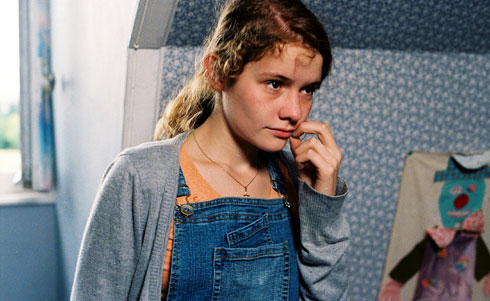It helps that Clara Augard looks like a real teenager and not one of those lip-glossed anorexic clones who populate US high-school dramas.
With a title borrowed from Serge Gainsbourg, it should be no great surprise that Katell Quillévéré’s feature debut Love Like Poison combines subversiveness with musical eclecticism and a touch of bawdy humour. Quillévéré isn’t trying to pick up the mantle of Claude Chabrol — this is a coming-of-age drama set in rural Brittany and punctuated with some unexpected English folk songs. Even if you’ve had your fill of adolescent angst, narcotic experiments and clandestine gropings, the fearless performance here of young Clara Augarde is reason enough to watch.
The story begins in church, with 14-year-old Anna (Augarde) being distracted during Holy Communion by winsome choirboy Pierre (Youen Leboulanger-Gourvil) giving her the eye. This is the first of several occasions in the film when Anna’s behaviour during a religious service doesn’t meet the expectations of her pious mother Jeanne (Lio). It also neatly sets up the main theme of the age-old conflict between spiritual observance and the pleasures of the flesh.
Adolescent dramas are often heightened by the physical or emotional absence of the parents. Here Anna’s mother is in crisis because her husband Paul (Thierry Neuvic) has gone off with another woman. In a break from boarding school, Anna and Jeanne are staying with Paul’s father Jean (played by veteran actor Michel Galabru), whose earthy humour and priapic tendencies have clearly not been suppressed by chronic ill-health. But as the day of Anna’s confirmation looms, her growing awareness of her sexuality threatens to deepen the rift in the family.
If all this sounds like the set-up for one of Catherine Breillat’s overly explicit explorations of female sexuality, it isn’t. The script, co-written by Quillévéré with Mariette Désert, doesn’t shy away from addressing the effect that the nubile Anna has on her grandfather, young Pierre and even – in one startling confrontation – her own mother. It is hard to give an honest but non-exploitative portrayal of a young woman who’s aware of her own erotic power, but still under the sway of the Church. Love Like Poison succeeds because Augarde, who makes an impressive film debut here, conveys all the turmoil in Anna’s life with great subtlety.
It helps that she looks like a real teenager and not one of those lip-glossed anorexic clones who populate US high-school dramas. Although the story isn’t told entirely from Anna’s viewpoint, we share her discomfiture as she watches her mother crying, or when the amorous Pierre pins her down on a “sacrificial rock”. Her subsequent haste to rinse her hair under a tap is much more than a gesture towards outward cleanliness. Presumably, the fainting fits that occur during a village funeral and then at her own confirmation, are also manifestations of the stress she is under.
Though Love Like Poison runs under 90 minutes, Quillévéré allows all her characters room to breathe. This story is as much about Jeanne’s marital and spiritual crisis as her daughter’s desire to break free. The handsome young priest François (Stefano Cassetti) offers support to the whole family, though he makes no headway at all with the defiantly unreligious Jean. But it’s the demands made on his time by the despairing Jeanne that threaten the delicate balance between personal and professional. No dialogue is necessary to convey the unending struggles faced by a man of the cloth against the lure of carnality.
If you’d asked me whether Greensleeves would be an appropriate choice of music for a contemporary French drama, I would have been highly sceptical. Quillévéré’s mix of organ music, a cover of Radiohead’s Creep and some very traditional English songs will jar with some viewers. But for me, the early montage set to Barbara Dane’s rendition of Greensleeves is a perfect way to set the scene. François cuts a lugubrious figure as he stands in the teeming rain, contemplating the massive tombstones and the moss that’s disfiguring the inner wall of his church. He’s just one, well-intentioned man, engaged in an eternal battle against forces he can’t control.
(Love Like Poison is released in UK cinemas on 13 May.)
Review first published @ Sound on Sight






